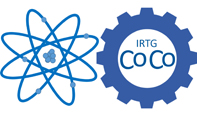15.05.2018 - Philipp Treutlein - Many-particle entanglement in Bose-Einstin condensates
| When |
May 15, 2018
from 06:00 PM to 07:00 PM |
|---|---|
| Where | HS II, Physik Hochhaus, Hermann-Herder-Str. 3 |
| Add event to calendar |
|
Entanglement is a fundamental concept of quantum physics that still presents many conceptual challenges, in particular when applied to many-body systems of indistinguishable particles. At the same time, it is an essential resource for quantum technologies such as quantum metrology with atomic clocks and interferometers [1]. I will give an introduction to many-particle entanglement and quantum metrology with a focus on experiments with atomic Bose-Einstein condensates.
In our experiment, we use an atom chip to control collisional interactions in two-component BECs in order to generate spin-squeezed states. These states are useful for quantum metrology, which we demonstrate experimentally by performing atom interferometry with a precision beyond the standard quantum limit [2].
To study entanglement in the spin-squeezed BEC, we perform high-resolution imaging of the spin state of an expanded condensate. This allows us to directly measure the spin correlations between spatially separated regions of various shapes, confirming the presence of entanglement in this system of indistinguishable atoms. Our data show bipartite correlations strong enough for Einstein-Podolsky-Rosen (EPR) steering [3]: we can predict measurement outcomes for non-commuting observables in one spatial region based on a corresponding measurement in another region with an inferred uncertainty product below the Heisenberg relation. This demonstrates the EPR paradox with a massive many-particle system.
Furthermore, we experimentally demonstrate that our system violates a quantum mechanical witness inequality for Bell correlations [4]. Concluding the presence of Bell correlations is unprecedented for an ensemble containing more than a few particles. Our work shows that the strongest possible non-classical correlations are experimentally accessible in many-body systems, and that they can be revealed by collective measurements. This opens new perspectives for using many-body systems in a variety of quantum information tasks.
[1] L. Pezzè, A. Smerzi, M. K. Oberthaler, R. Schmied, and P. Treutlein, Rev. Mod. Phys., to be published, arXiv:1609.01609v3
[2] C. F. Ockeloen, R. Schmied, M. F. Riedel, and P. Treutlein, Phys. Rev. Lett. 111, 143001 (2013).
[3] M. Fadel, T. Zibold, B. Décamps, and P. Treutlein, Science 360, 409 (2018).
[4] R. Schmied, J. D. Bancal, B. Allard, M. Fadel, V. Scarani, P. Treutlein, and N. Sangouard, Science 352, 441 (2016).
See poster.


